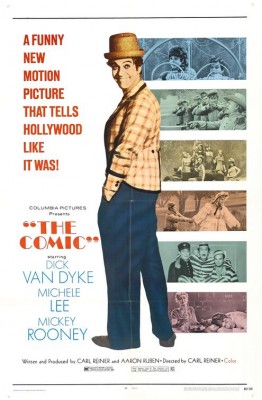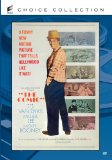| Reviews & Columns |
|
Reviews DVD TV on DVD Blu-ray 4K UHD International DVDs In Theaters Reviews by Studio Video Games Features Collector Series DVDs Easter Egg Database Interviews DVD Talk Radio Feature Articles Columns Anime Talk DVD Savant Horror DVDs The M.O.D. Squad Art House HD Talk Silent DVD
|
DVD Talk Forum |
|
|
| Resources |
|
DVD Price Search Customer Service #'s RCE Info Links |
|
Columns
|
|
|
Comic, The
Mess that it is, The Comic nonetheless is of great interest to fans of classic comedy. The recreations of silent era slapstick have an authentic feel and are genuinely amusing, with Van Dyke being especially good. His characterization and Billy Bright's painful story off-camera draws from the lives of a number of tragic clowns, particularly Harry Langdon and Buster Keaton, and other characters and incidents find inspiration from other people and films.
A Sony Choice Collection manufactured-on-demand release, The Comic is presented in 16:9 enhanced widescreen and the disc is region-free.
Like Sunset Boulevard's protagonist, Billy Bright (Dick Van Dyke) cynically narrates his life story, told in flashbacks, leading up to his death. In Sunset Boulevard Joe Gillis (William Holden) narrates while floating face-down in a swimming pool, a murder victim, while Billy Bright tells his story while lying in his coffin during his own funeral. (Comedian Mantan Moreland has a nice, uncredited bit in the opening scene.)
Sometime during the late-1910s Vaudeville clown Billy arrives in California to play a supporting part in a one-reel comedy modeled after the (Mack) Sennett Bathing Beauty series, though the basic set-up seems patterned after Men O'War (1929), an early Laurel and Hardy talkie. Here, as in that short, there are two sailors trying to pick up girls. One of the sailors is fat like Ollie, the other a diminutive patsy, "Cockeye" Van Buren (Mickey Rooney), a cross-eyed comedian based on Ben Turpin. (Though in the film it looks more like a bad eye.)
Billy is cast as the Charlie Hall-type comic foil, an ice cream vendor, and through a combination of unctuousness and subtle scene-stealing he becomes the best thing about the short, a feat he immodestly boasts about to actress Mary (Michelle Lee, who later played the wife of another unhappy comedian, Lou Costello, in Bud & Lou). Mary is already romantically linked to the film's director, Frank Powers (Cornel Wilde), but Billy seduces her away, his extreme confidence apparently offsetting an otherwise charmless demeanor when the cameras aren't rolling.
Billy soon becomes a big star, his screen persona and professional rise most similar to that of comedian Harry Langdon. Billy launches his own film company, announcing it to Mary on the day of their wedding, but his philandering drives her away. She leaves him and assumes custody of their young son. Billy goes to Europe to make pictures but, perpetually unhappy, sinks into alcoholism and his movies become less successful. When talkies arrive Billy clashes with his agent (Carl Reiner, in a broadly comic performance out of synch with the tone of the scene) and simply refuses to make sound films. The Hollywood studios, noting a sharp box-office decline in Billy's last several pictures, are only too happy to oblige him.
The movie shifts to modern times as Billy, now a balding old man with a ghastly comb-over (quite unlike how the even older but far more robust Van Dyke appears now, in his late-80s), is reduced to placing an announcement in the trades, advertising his willingness to accept any job. Steve Allen (playing himself) invites Billy to appear on his talk show, which leads to a minor comeback for Billiy making television commercials (as Buster Keaton did in the ‘60s) but there are further setbacks as he's beset with age-related illnesses. A dim-witted gold-digger (Nina Wayne) and her pushy mother (Pert Kelton) try to hustle Billy into marrying her, to latch onto his minor fame and meager income, and in a strange, very embarrassing scene Billy is briefly reunited with his son (also Van Dyke, inexplicably sporting a hooked nose), now a stereotypically gay fashion designer.
The most obvious problem with The Comic is that Billy Bright is a thoroughly unpleasant character off-screen: conceited beyond belief, self-destructively stubborn and arrogant, he brazenly cheats on his wife and is completely self-absorbed, refusing (even when he's dead!) to take any responsibility for his abhorrent behavior and bad career choices while not acknowledging even partial credit to any of his collaborators for his successes.
Billy Bright is usually likened to Keaton (the alcoholism, the custody battle over his sons, the late-in-life comeback) but personality-wise Keaton was Billy's opposite: shy, modest, generous, and hardly bitter to the extent Billy is. Other than his talent, Billy has no redeeming features at all. When he's an all-but-forgotten man, instead of evolving into a sympathetic character, he's merely pathetic. (Willy Clark, Neil Simon's similarly curmudgeonly and stubborn Vaudevillian from The Sunshine Boys is outwardly similar, but that's because inwardly he's scared to death of growing old and feeble. Billy Bright is simply a jerk.)
And yet, against all odds, the film's final scene, of Billy watching himself on TV in his greatest success, the City Lights-like silent film Forget-Me-Not, is strangely touching. If only more of the film were like that.
Dick Van Dyke is very good in the silent movie recreations, drawing from Stan Laurel and Harry Langdon, but his Billy Bright is also an original creation. The movie gets certain aspects of silent film comedy right while other aspects, such as late-‘60s hairstyles, fashions, and set decoration creeping into scenes set in the 1910s and ‘20s, don't ring true. But a long series of "highlights" from Billy's silent career is probably the best thing about the film.
As much as crabby Billy, a big part of the problem with The Comic is the film's strange tone. It's almost as if Reiner and Ruben (a director on Caesar's Hour and The Phil Silvers Show) originally conceived it as a straight drama with scenes from Billy's films offering the only comedy relief, but that at some point they decided to drop in a lot of cynical humor hoping to make the entire picture humorous, even in places where the humor doesn't quite fit. Reiner's broadly played agent is one example, but there are many awkwardly inserted bits throughout, leaving the audience unsure of how to react. Other parts of the film are simply odd: in one scene Billy imagines his own funeral, dramatized as a Citizen Kane-type fake newsreel, portentously narrated by Paul Frees.
Dick Van Dyke's career foundered a bit after The Dick Van Dyke Show ended. His unique appeal also made him very hard to cast in feature films in roles that weren't variations of Rob Petrie. Through the years Chitty Chitty Bang Bang has become a family favorite but even in that his character is at times off-putting and the movie was considered a big flop when it was new. Van Dyke played yet another unlikeable character in Norman Lear's Cold Turkey, but that brilliant, underrated film used Van Dyke's character very cleverly and it's by far his best comedy feature.
I suspect Columbia Pictures wasn't too happy with The Comic. Pert Kelton, who has a prominent role late in the film, died in October 1968 and probably filmed her scenes at least a month or two before that, yet The Comic wasn't released until November 1969, more than a year after her death. This to me suggests the studio didn't know quite what to do with the film, sat on it, and when they finally did release it they seem to have dumped it into the marketplace without much fanfare.
Video & Audio
The Comic is presented in an okay 1.78:1 enhanced widescreen transfer, approximating the original 1.85:1 theatrical version. It looks okay; the title elements aren't in good shape, but the rest of the feature looks pretty good. The mono audio, with no subtitle options, is likewise. The disc is region-free and there are no menu screens and, sadly, no Extra Features.
Parting Thoughts
Not good but of great interest for those who love silent film comedy, Dick Van Dyke (and who doesn't?), as well as the lives of the silent clowns and their sometimes personal and professional tragedies. Recommended.
Stuart Galbraith IV is the Kyoto-based film historian and publisher-editor of World Cinema Paradise. His credits include film history books, DVD and Blu-ray audio commentaries and special features.
|
| Popular Reviews |
| Sponsored Links |
|
|
| Sponsored Links |
|
|
| Release List | Reviews | Shop | Newsletter | Forum | DVD Giveaways | Blu-Ray | Advertise |
|
Copyright 2024 DVDTalk.com All Rights Reserved. Legal Info, Privacy Policy, Terms of Use,
Manage Preferences,
Your Privacy Choices | |||||||















